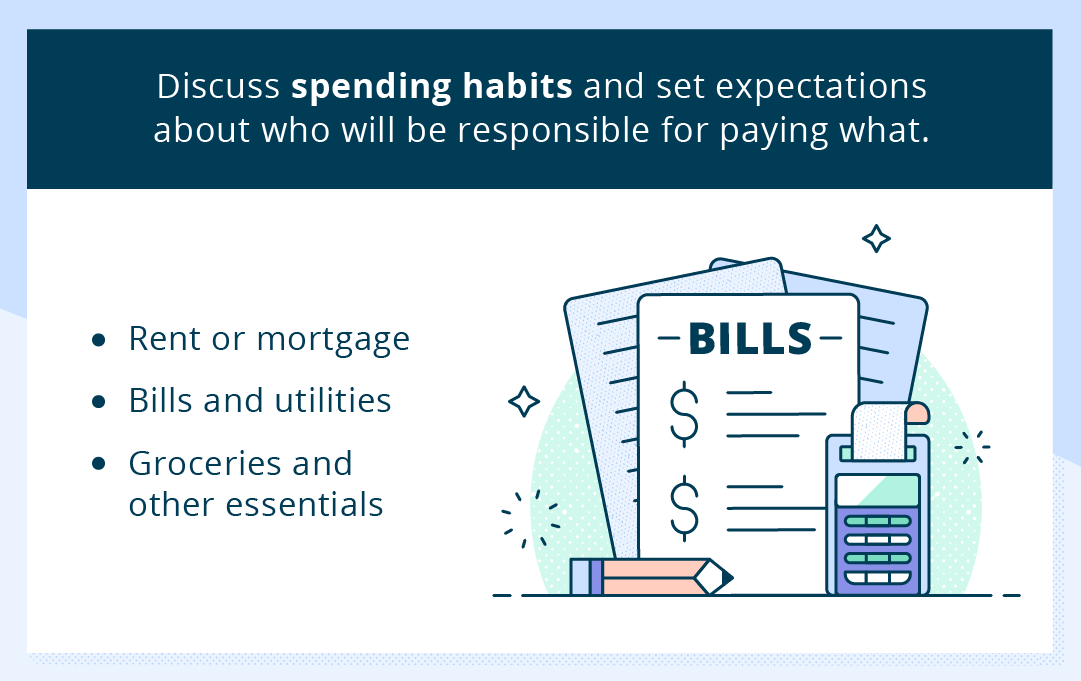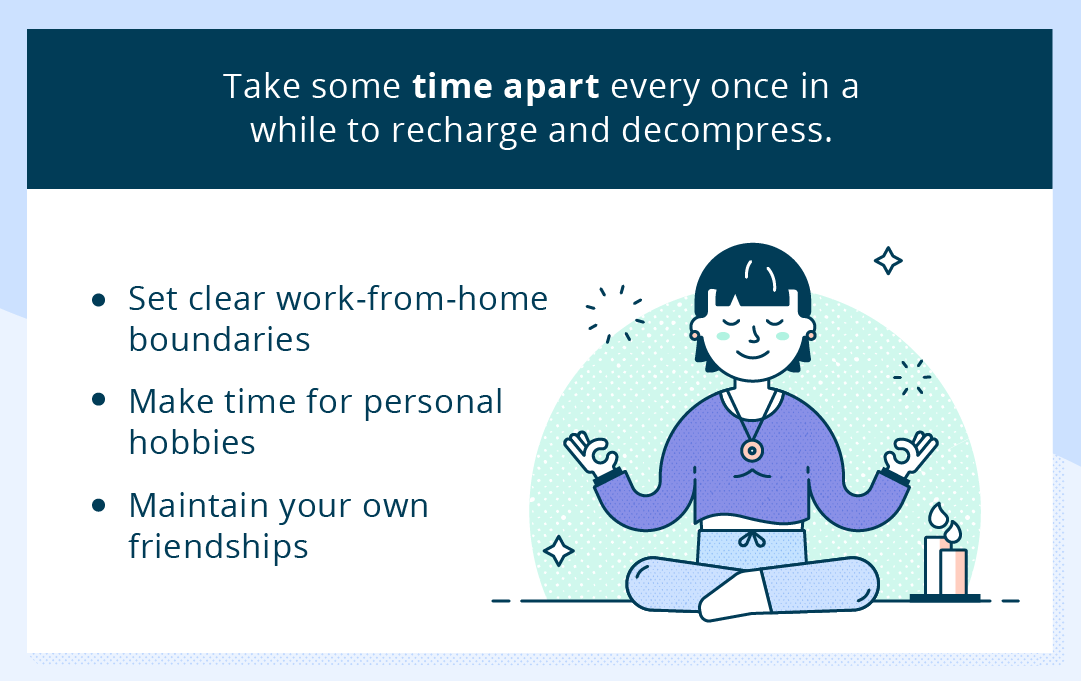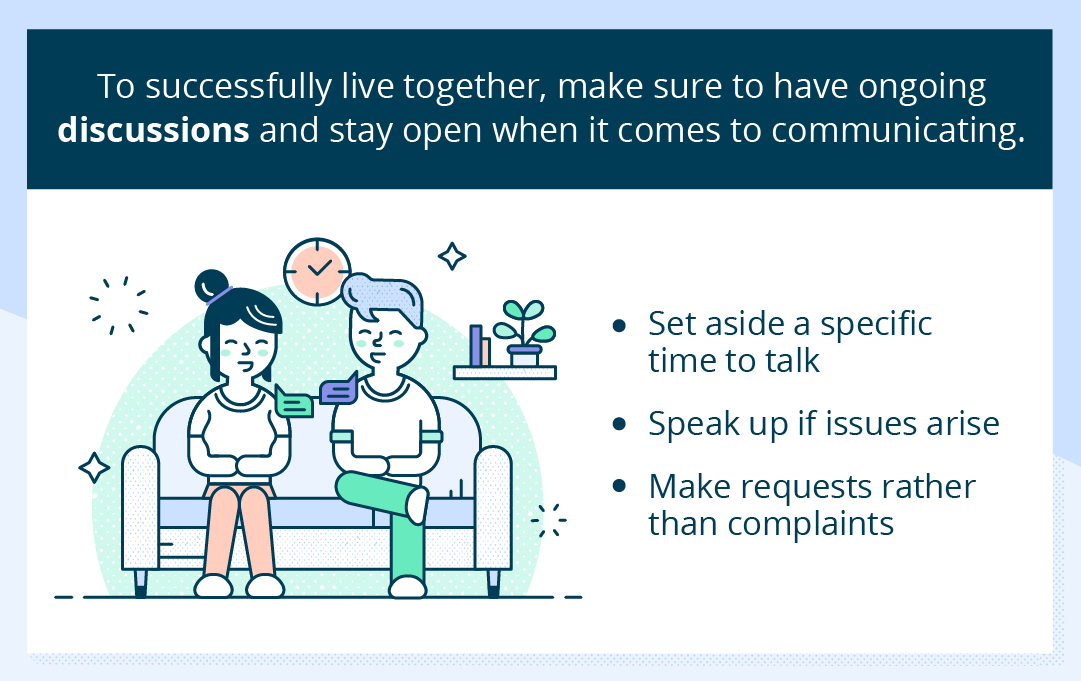12 min read
Beyond Traditional Loans: 14 Creative Financing Options for Real Estate Investing
Creative financing can offer real estate investors options beyond traditional lending from banks. If you have less-than-ideal credit or lack a sizeable...

Deciding to move in together is a huge step to take as a couple. This transition can be an exciting adventure, but can also pose some challenges along the way. Whether you’re newlyweds or just ready to take the move-in plunge, there are a lot of things to discuss, such as living habits and finances.
From the important discussions to have before moving in to tips and tricks on cohabitating, our guide breaks down how to successfully navigate living together as a couple and make the transition a peaceful one.
Pro Tip: Stress less about moving in with your partner by hiring professional local movers to do the heavy lifting for you! Then check out our Renter’s Toolkit for more services designed to streamline the moving process.
Although there are many benefits to living together — such as shared rent expenses and always being by your loved one’s side — there are some things to talk about and consider before making the move.
It’s important for you both to have open minds and realistic expectations. In addition to tips for living peacefully with your partner, we turned to relationship experts and therapists to gather advice on key discussions you should have prior to moving in together.
First things first, make sure the reasons why you want to live together are clear. Perhaps you’re on your way to getting married and you just bought your first house together, or you both want to take that next step in your relationship.
Dr. Ellen Tang, a therapist at Ellen Tang Coaching, advises that you should talk about why you want to move in together. Are you going to rent or buy a place together so that it feels like ‘ours’ rather than ‘mine’ or ‘yours’? Or is one of you moving into the other’s accommodation and therefore has to follow their house rules and expectations? “If these expectations aren’t clear in the very beginning, it could set the pace for arguments down the road,” Tang states.

“Money is one of the most common areas of conflict in long-term relationships, so it’s important to set the expectations early on in the move-in process,” according to Trisha Andrews, a family therapist at Amanda Atkins Counseling Group.
Have a discussion with your partner and address who will be responsible for paying what, like rent or mortgage, groceries, and other bills. This is also a great time to discuss spending and saving patterns, and if there are any debt issues. Getting these sometimes uncomfortable topics out of the way is best to make sure that you both feel you’re being treated fairly in the relationship. For more details on how to financially plan with a partner, visit here.

Before you make the next big move, talk about how you’ll schedule chores and divide household tasks. When it’s clear what each person is expected to do, living together can become so much easier and conflict-free.
Now is also a good time to bring up any bad habits. Does your partner insist on doing all the dishes before calling it a night when you’re at their place? Or do they insist on leaving dirty dishes in the sink? Those seemingly little things that rub you the wrong way might be sources of real irritation once you’ve committed to moving in together.
Marriage therapist David Bowers, owner of Thriveworks Columbus Polaris, recommends that you “have regular on-going discussions about this to figure out who does what and to ensure each partner feels the other is contributing fairly.”

Another important discussion to have before moving in is how much time is expected to be spent together in your new home. Setting up boundaries around personal space and independence is a crucial topic in new cohabitating relationships, according to Tang.
Often, one partner is more independent and one more dependent. Having regular conversations about expectations around how much time is spent together and individually will help you prevent arguments down the road.
After having important discussions before you make the move, here are four tips to cohabitate successfully.
Make sure you prioritize your own alone time. Taking time to recharge and decompress by yourself is important — and it’s important you respect your partner’s alone time as well. Even though you live together, it doesn’t mean you have to do everything together. Do things separately every once in a while and be sure to maintain your personal friendships, as this can enhance individual and relational well-being, says Bowers.
Another aspect of personal space comes into play when working from home. Be sure to set up clear work-from-home boundaries and work spaces. If you two are at home a good bit of the time, it can be easy to accidentally interrupt the other’s workday without advance discussion. Even if a couple is working in the same room, it can be important to agree that chit chat is off limits outside of agreed work times.

Compromise and communication are key elements for living together. You want to make sure your significant other is heard. According to Dr. Wyatt Fischer, a licensed marriage therapist and host of Marriage Podcast, “the art of successful cohabitation is being able to find wins that work for both of you in areas of difference.” For example, if one of you prefers to sleep in and the other wakes up early, you’ll have to find ways of meeting in the middle.
Another way to encourage communication is to speak up when your partner does something that bothers you. Usually making requests, rather than complaints, is more effective in coming to an agreement and solving any problems.

Make sure you have enough space in your living arrangement! According to psychotherapist Nancy Johnston, “a healthy relationship involves having time and space together as well as time and space for yourself. Having space for yourself helps with re-charging, being aware of how you are and what you need, and fostering your sense of self.” So, make sure that you get a big enough place for both of you to comfortably store your stuff and have privacy from time to time.
If you’re already all moved in, get rid of stuff you don’t need and make sure you create a space of your own. Even though you’re building a shared space, it’s crucial to say true to your own interests and personality as you come together. Have a spot in your home that feels like your own and reflects your taste.

To make sure you have enough space for the both of you, decide what to keep, toss, or donate while you’re unpacking. During the process of combining your households and downsizing, make sure you keep a few meaningful items or special knick-knacks for yourself. Whether it’s a childhood blanket, your favorite college sweatshirt, or your grandma’s jewelry box, don’t be afraid to keep a few artifacts from your single life.
Rather than pick an argument or live with regret over getting rid of something special, consider putting keepsakes, furniture, and household items you’re not certain about in a storage unit. Having extra items stored away is especially great if you plan on moving into a bigger home in the next few years!
If you and your partner are feeling stuck as you sort through your things, check out this flowchart that will help you decide whether to keep, toss, or donate!

Although moving is stressful and a huge step in a relationship, be sure to follow this guide and advice from these relationship experts to make living together a breeze. If you’re a landlord who’s looking for the perfect couple to fill an apartment, visit our rental application and tenant screening services to help find your next tenants.
12 min read
Creative financing can offer real estate investors options beyond traditional lending from banks. If you have less-than-ideal credit or lack a sizeable...
11 min read
If you came here wondering how to write a lease agreement, look no further. Creating iron-clad rental contracts is essential for protecting the rights...
10 min read
Between the risks of running a business, a volatile and ever-changing real estate market, and the sometimes fickle attitudes of the renting...
Join the 700,000+ independent landlords who rely on TurboTenant to create welcoming rental experiences.
No tricks or trials to worry about. So what’s the harm? Try it today!
TurboTenant, Inc., © 2025
Created in Sunny Colorado